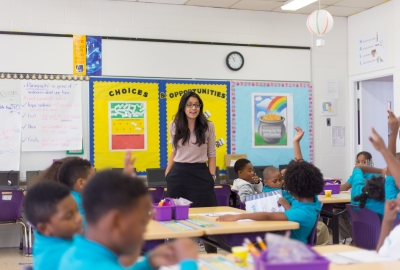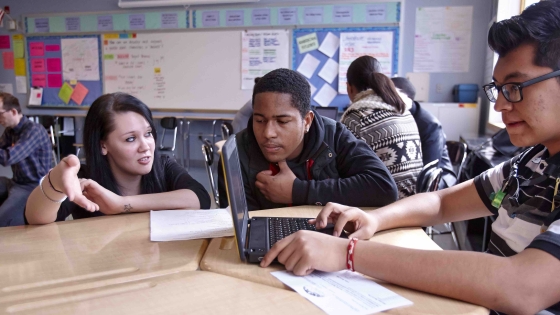
Questions About:
Questions About the Organization
What are the defining characteristics of the Research Alliance for New York City Schools?
Our work is distinguished by a number of key capacities and guiding principles, including:
- A focus on one place—New York City;
- Genuine engagement with education stakeholders;
- High standards of scientific rigor;
- Our longitudinal data archive, which is the largest and most comprehensive of its kind;
- A commitment to advancing racial justice and equity;
- A belief in the value of inclusion and diversity;
- Clear communication of findings to a range of audiences;
- Multiple funding sources to help ensure our independence; and
- A firm commitment to nonpartisanship.
What is the Research Alliance’s relationship with the New York City Department of Education?
The Research Alliance for New York City Schools is a nonpartisan research center housed at New York University, within the Steinhardt School of Culture, Education, and Human Development. Our goal is to conduct studies that are useful and relevant for education policy and practice. Therefore, we collaborate with the New York City Department of Education (DOE), as well as individual schools and educators, to develop our data archive, identify important research questions, and to share frank, constructive feedback based on our findings. We have a formal data use agreement with the NYC DOE that allows our staff and partners to conduct rigorous, reliable studies based on up-to-date information.
What is the Research Alliance’s governance structure and relationship to NYU?
The Research Alliance was founded in 2008 as a research center housed at New York University, within the Steinhardt School of Culture, Education, and Human Development.
The Research Alliance’s operations and research agenda are guided by a Founding Charter and a Steering Committee representing key stakeholder groups, including the teacher and administrator unions, business and community organizations. The Chancellor of the New York City Schools and the Provost of New York University both serve as ex officio members of the Steering Committee. Visit our Steering Committee page for a complete list of members.
The Executive Director of the Research Alliance is responsible for managing all of its operations and activities, including budget, funding, research agenda, research projects, dissemination activities, data, and relationships with individuals and organizations inside and outside of NYU.
Questions About Our Work
What type of studies does the Research Alliance conduct? Who is the audience for the Research Alliance’s work?
We examine policies and programs aimed at improving outcomes for the City’s students and educators. This includes studies focused on challenges as well as promising practices in NYC schools. We perform both qualitative and quantitative research, conducting independent analyses of existing data and performing extensive fieldwork and surveys.
Our staff includes researchers from a variety of academic backgrounds, including education, statistics, sociology, psychology, communications, public policy, and other social and applied sciences. Many of our researchers have a teaching background, which helps us develop and carry out studies that are firmly grounded in the realities of schools and classrooms. Our findings are subject to extensive internal and external review before publication, to ensure that our work meets high scientific standards and is meaningful for education policy and practice.
We work to share our findings in formats that are accessible and useful to education practitioners, policymakers, and other stakeholders. We provide ongoing feedback to the partners we’re working with—including individual schools, DOE staff, funders, and other organizations—and we publicly release our findings at regular intervals. Whenever possible, we include actionable recommendations that schools and districts can implement.
While our research focuses on NYC, we believe that our work has valuable lessons for other urban school districts around the country. Many of our reports include lessons or findings that are relevant for national as well as local audiences.
For a complete list of our studies and public reports, please see our projects and publications pages.
How does the Research Alliance maintain its independence?
While we work closely with a variety of education stakeholders, the Research Alliance actively guards our independence, so we can serve as a credible, nonpartisan source of evidence about NYC’s schools.
Several factors help us to maintain this independence. First, our Steering Committee is characterized by a wide range of perspectives on key issues. The committee includes representatives from the NYC DOE, the teacher and administrators unions, academia, and business and community groups. Second, we receive funding from diverse public and private sources—supporting both specific projects and general operations. Third, as a research center housed at NYU Steinhardt, we benefit from a robust institutional infrastructure as well as a commitment to academic freedom and the sharing of new ideas and knowledge. Finally, our staff and partners are dedicated to the Research Alliance’s mission—we believe we are valuable to our partners, including the DOE and schools, precisely because we offer objective, nonpartisan analysis and recommendations.
How does the Research Alliance select topics to study?
In 2009, the Research Alliance Steering Committee identified four general areas of research that we use as our starting point when planning new projects. We periodically revisit these areas of study to ensure that they remain relevant, to consider additional projects, and to identify gaps where we should direct new project resources.
Ideas for new analyses and projects come from a variety of sources, both within and outside of the Research Alliance. Choices about what to work on are informed by our staff’s areas of expertise and past research, new policy priorities and initiatives of the DOE, and conversations with educators, funders, or others who care about our City’s schools.
This approach affords us the flexibility to conduct fast-response analyses in response to specific requests or emerging issues. These analyses, in turn, often lay the groundwork for larger projects that we develop over time. In this way, we are able to respond to needs expressed by a variety of NYC education stakeholders, as well as questions that we see unanswered in the existing body of education research.
Questions about Data
Can the Research Alliance share data?
Large amounts of information about New York City schools are publicly available online via the NYC DOE and other public agencies. The Research Alliance has compiled school-level information from these public sources into a user-friendly file called the School-Level Master File (SCHMA) that many researchers find helpful. The SCHMA can be requested on our website.
The Research Alliance has also complied a larger data archive, consisting of extensive data provided by the NYC DOE and other sources. The terms of our data use agreement with the NYC DOE allow Research Alliance staff and collaborators to use individual-level data provided by the NYC DOE for the purposes of studies conducted for and on behalf of NYC public schools. Under certain conditions, the Research Alliance also provides access to data from our archive to other researchers not formally affiliated with the Research Alliance. This access is governed by—and always in accord with—our agreement with the NYC DOE, as well as provisions of the Family Educational Rights and Privacy Act (FERPA). Data-sharing requests are considered on a case-by-case basis.
How does the Research Alliance protect confidential data?
As part of our commitment to the wellbeing of NYC students, we take the utmost care in safeguarding our data archive and protecting students’ privacy. All of our physical data storage is securely maintained by New York University. Any personally identifying information is held in the University’s highest-security data center, and is only accessible to a select group of pre-approved Research Alliance staff. These data can only be accessed from specific, secure work stations, and are never downloaded or copied (except as authorized and specifically requested by the NYC DOE).
Before conducting analyses, we remove from the data all personally identifiable information (name, address, Department of Education ID numbers, etc.). This enables us to share anonymized data with our research partners.
Finally, before receiving access to our data, staff and collaborators must sign a legally binding nondisclosure agreement.
These and other measures allow us to fully protect student, parent, and school employee information.
Questions about getting involved
How can I work with the Research Alliance?
If you are interested in employment at the Research Alliance, please visit our careers page.
Can I use/reprint/link to Research Alliance publications?
All of our reports are freely available on our website. We encourage you to share them with colleagues, students, or anyone else who might find them useful. If you would like to link to one of our reports, or include it in a course syllabus, please let us know by emailing dariana.almeyda@nyu.edu.
Please use the following preferred citation format when referencing our publications:
Author. Title (Year). New York, NY: The Research Alliance for NYC Schools.
How can I learn more about the Research Alliance?
We encourage you to sign up for our newsletter for regular updates about new projects, publications, events, and other news. If you have a specific question that isn’t answered on the website, please contact research.alliance@nyu.edu. If you are a member of the press, please visit our Newsroom or contact the Communications Coordinator at dariana.almeyda@nyu.edu.

